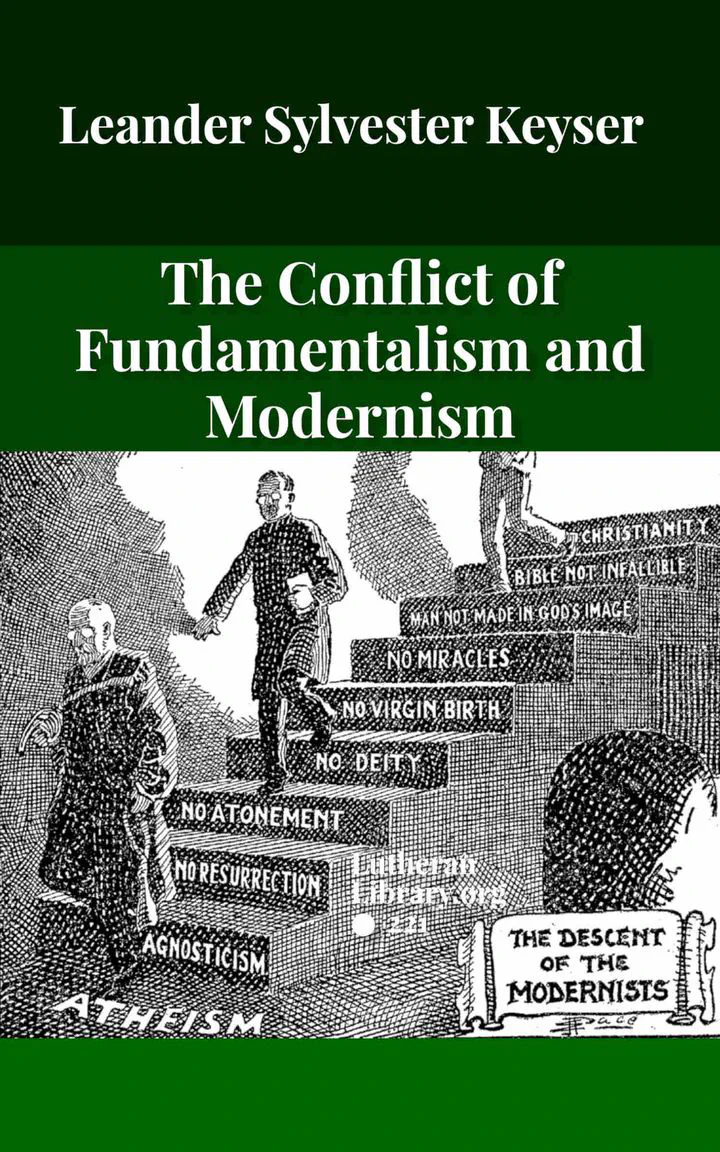The Conflict Of Fundamentalism And Modernism by Leander Sylvester Keyser

“Modernism accepts just as much of the Bible as suits its subjective conceptions, and then turns around and protests that it believes the Bible. This is certainly not accurate. It ought to say that it accepts such parts of the Bible as agree with its own ideas, and rejects the rest.
“Moreover, [they] regard themselves as perfectly competent to pick and choose from the Bible just what people need to believe and what they do not need to believe. For my part, to be perfectly frank and honest, I confess that, having read their utterances in extenso, I do not have enough confidence in their logic, their knowledge and their spiritual discernment to risk my temporal and eternal welfare on their judgment. – Leander Keyser
Leander Sylvester Keyser (1856-1937) was educated at Wittenberg College Seminary, Springfield, Ohio, and served pastorates in Indiana, Kansas and Ohio. In 1911 he became professor of Systematic Theology at Hamma Divinity School, and was considered one of the leading theologians of the General Synod. Prof. Keyser’s books include The Conflict Between Fundamentalism and Modernism, The Rational Test, A System of Christian Evidence (Apologetics), A System of General Ethics, A System of Natural Theism, and In The Redeemer’s Footsteps.
Level of Difficulty: Primer: No subject matter knowledge needed.
Book Contents
Preface by Lutheran Librarian
Publishers’ Note
Just A Brief Foreword
- 1 The Crucial Nature Of The Conflict
- 2 The Main Features Of Modernism
Some Tenets To Be Commended
- 1 Theism
- 2 The Modernists often display a high regard for the Bible that is, as they have “expurgated” it.
- 3 In general the Modernists have a high regard for Christ.
Modernistic Holdings Of The Wrong Kind
- 1 As its name implies, it professes to be very “modern.”
- 2 Another hallmark of the Modernists is their boast of “scholarship.”
- 3 A third insignia of Modernism is its rationalistic attitude toward the Bible.
- 4 Evolution.
- 5 Arm in arm with the acceptance of evolution goes, to a large degree, the rejection of the supernatural.
- 6 There are at least six specific doctrines of historic Christianity that the Modernists cannot accept.
- 7 Praise of “Ethnic Religions”.
The Position Of The Fundamentalists
- 1 It may be frankly admitted that some of them are more earnest than gentle.
- 2 The Fundamentalists stand firmly, unalterably for the orthodox doctrines.
- 3 Taking a firm and stalwart position on the Bible, they logically accept, ex animo, whatever they believe to be the clear teaching of the Bible.
- 4 The Fundamentalists also hold it to be a Christian duty to defend the faith, and not to sit idly by and let the enemies beset and capture the citadel of truth.
- 5 Fundamentalism is not Premillennialism.
- 6 The Fundamentalists are sometimes accused of being opposed to science.
What Is The Duty Of The Evangelical Churches?
- 1 They surely cannot remain placid and indifferent in this crucial contingency.
- 2 Many strong books have been published in recent years on the positive side of this controversy.
- 3 Summary of These Works.
Dr. Keyser’s Book List
- A System of Christian Evidence
- A System of General Ethics
- A System of Natural Theism
- The Problem of Origins
- The Doctrines of Modernism
- The Rational Test
- Man’s First Disobedience
- A Handbook of Christian Psychology
- In the Redeemer’s Footsteps
- In the Apostles’ Footsteps
Copyright Notice
Publication Information
- Lutheran Library edition first published: 2018.
- Updated and paperback offered: 2021
- Copyright: CC BY 4.0